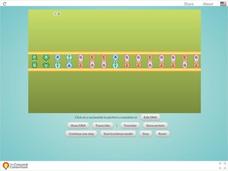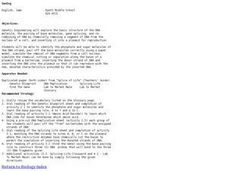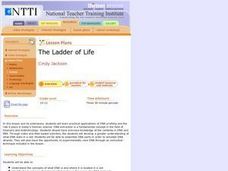Curated OER
Cut-off Genes
Investigate the relationships between different deep-sea organisms by DNA sequencing. A worksheet provides instructions for DNA sequencing and space to work. They simulate gel electrophoresis by cutting out paper "DNA strands."...
Serendip
Genetics
A handout on genetic inheritance begins with a reading on alleles and how they can result in albinism. Junior geneticists learn to complete Punnett squares and participate in a coin toss simulation of allele pairing. They also learn...
Concord Consortium
Modeling Transcription
Transcription makes copies of the instructions inside all living things. Scholars use the simulation to separate DNA and transcribe the RNA. They see a demonstration of the nucleotide pairings as well as the start and stop instructions.
Concord Consortium
Mutations
Are some mutations more damaging than others? An engaging simulation encourages scholars to alter DNA through insertion, deletion, and substitution. It then forms resulting amino acids—or not—and the resulting protein—or not—depending on...
Curated OER
DNA Sequencing Simulation
High schoolers simulate the Sanger method of DNA sequencing using color pop-beads as a representation of nucleotides and dideoxynucleotides. Students assemble DNA sequences and run their sequences through a "sequencing gel" and sketch...
Curated OER
Where's the CAT? a DNA Profiling Simulation.
Young scholars explore DNA technology. Students participate in a simulation to perform at the basic steps of a DNA profile. They observe copies of DNA sequences, construct DNA probes, and discuss outcomes of their experiment.
Curated OER
Simulation of Gene Splicing
Learners simulate gene splicing by examining bacteria. They create a bacterial DNA into which they insert the human DNA (gene) that codes for growth hormone. They cut the sites of the enzyme to study how the human DNA can be joined to...
Curated OER
DNA Fingerprinting Simulation
In this DNA fingerprinting simulation worksheet, students perform an activity that represents using a gel electrophoresis. Students decide who commits a crime in a forensics style lab.
Curated OER
DNA Fingerprinting: You Be the Judge!
High schoolers use their knowledge of DNA fingerprinting to evaluate the use fingerprints in courts, and will address the ethics of establishing a national database of fingerprints.
Curated OER
DNA Fingerprinting: You Be the Judge!
Students explore DNA fingerprinting. Students discover how DNA fingerprinting is done and judge the validity. They evaluate the use of certain prints in courts and address the ethics of establishing a national database of fingerprpints.
Curated OER
Are You Gellin
Learners conduct an investigation of differentiating between different types of DNA. This is done with a simulation activity of being a scientist in charge of selling different sets of DNA for research which requires different...
Curated OER
From Restriction Maps to Cladograms
Biology aces analyze restriction maps to determine the relationships among different primate species and then complete a cladogram. Preface this instructional activity with an explanation of how restriction enzymes are used to create the...
Howard Hughes Medical Institute
Visualizing Gene-Expression Patterns
How do genetics gurus know so much about gene expression? See traits materialize before your very eyes using a presentation with embedded simulations. Science scholars develop an understanding of the techniques used to follow the work of...
Curated OER
Simulation of Gene Splicing
Students use the exercise as a prelude to a "wet" lab or as a substitute for such a lab. It correlates well with colony transformation labs. This lab is recommended for students what have difficulty with the abstractions that genetic...
Manitoba Education and Early Childhood Learning
Forensic Sciences: A Crime Scene Investigation Unit
Mr. Bergman has been murdered and we need you to solve the crime! The cross-curricular unit covers 11 different types of forensic science and includes 17 activities. Scholars perform blood type analysis, blood spatter analysis,...
Curated OER
GenEng
Students investigate the process of genetic engineering. In this genetic engineering lesson plan, students use paper models of DNA and plasmid bacterium to investigate the process of replicating DNA, splicing genes from DNA, and...
Curated OER
And the Verdict Is...
Students identify the unique pattern DNA forms in each individual, and how that pattern can be used to identify criminals. They have the opportunity to simulate the process of matching DNA samples to those taken at a crime scene.
Curated OER
Games and Activities to Teach Molecular Genetics
Students demonstrate a working knowledge of cell interactions such as DNA replication, protein synthesis (transcription and translation), through active participation in a cooperative group.
Curated OER
Polymerase Chain Reaction (PCR)
Students explore how PCR works through various activities. In this biology lesson, students explain how PCR generate copies of DNA. They simulate the process using an online interactive website.
Curated OER
The Ladder of Life
Students explain the concepts of what DNA is and where it is located in a cell, identify the two types of molecules that make up the rungs of a DNA molecule and identify the two types of Purine and Pyrimidine molecules
Curated OER
Science Lesson: Chocolate Flavored Cherries
Students are able to identify start and stop sequences in DNA. They are able to model using restriction enzyme and ligase to remove sections of DNA and reattach them. Students are introduced to the process of recombinat DNA through the...
Curated OER
Protein Synthesis
In this protein synthesis learning exercise, students use a given strand of DNA to write the complimentary base pairs. They transcribe the message to the RNA and then they translate the message into the proper amino acids using the...
Curated OER
Gel Electrophoresis
Students conduct a variety of experiments to explore gel electrophoresis. In this biology lesson, explain how this process separate DNA and RNA. They discuss the practical applications of this method.
Curated OER
Who Ate The Cheese?!
In this crime scene investigation worksheet, students simulate DNA sequencing and DNA restriction analysis using paper strips of DNA. Students compare the crime scene DNA to the suspects and determine who is guilty.























